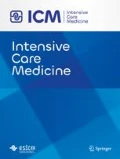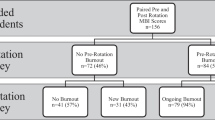Abstract
Objectives
Caring for acutely ill patients imposes significant demands on physicians. The environment and stresses of the ICU may lead to the burnout syndrome. The purpose of this study was to evaluate the prevalence of burnout among internal medicine intensivists and the contributing factors present in ICU practice.
Design
Mailed survey utilizing the Maslach Burnout Inventory (MBI). Increasing burnout has been shown to be associated with low levels on personal achievement and high scores on depersonalization and emotional exhaustion.
Subjects
Random sample of members of the Internal Medicine Section of the Society of Critical Care Medicine.
Measurements and main results
248 people responded: 220 (88.7%) males and 28 females. Mean age of all respondents was 41.6±6.7 years. The majority (58.1%) worked in large hospitals (>400 beds); 55.6% devoted more than 50% of their time to critical care. The emotional exhaustion subscale of the MBI averaged 22.2±9.5, with a third of respondents scoring in the high range. The depersonalization score averaged 7.1±5.1%, with 20.4% of respondents scoring in the high range. Similarly personal achievement subscores were poor, with a mean value of 30.9±6.4%, with 59% scoring in the low range. High levels of emotional exhaustion were associated with anticipating leaving critical care before retirement.
Conclusions
Burnout as measured by the MBI appears to be common in internal medicine intensivists. High levels of emotional exhaustion and depersonalization are related not only to patient care issues but also to a poor support system.
Similar content being viewed by others
References
Reuben DB (1985) Depressive symptoms in medical house officers. Arch Intern Med 145:286–288
Firth-Cozens J (1987) Emotional distress in junior house officers. BMJ 295:533–539
Butterfield PS (1988) The stress of residency. Arch Intern Med 148:1428–1435
McCue JD (1985) The distress of internship: causes and prevention. N Engl J Med 312:449–452
Rudner HL (1985) Stress and coping mechanisms in a group of family practice residents. J Med Educ 60:564–566
Whitley TW, Gallery ME, Allison EJ, Revicki DA (1989) Factors associated with stress among emergency medicine residents. Ann Emerg Med 18:1157–1161
Schwartz AJ, Black ER, Goldstein MG, Jozefowicz RF, Emmings FG (1987) Levels and causes of stress among residents. J Med Educ 62:744–753
Aach RD, Cooney TG, Girard DE, Grob D, McCue JD, Page MI, Reinhard JD, Reuben DB, Smith JW (1988) Stress and impairment during residency training: strategies for reduction, identification and management. Ann Intern Med 109:154–161
Rotbart HA, Nelson WL, Krantz J, Doughty RA (1985) The developmental process of residency education. AJDC 139:762–765
Lewittes LR, Marshall VW (1989) Fatigue and concerns about quality of care among Ontario interns and residents. Can Med Assoc J 140:21–24
Girard DE, Sack RL, Reuler JB, Chang MK, Nardone DA (1980) Survival of the medical internship. Forum Med 3:460–463
Oehler JM, Davidson MG, Starr LE, Lee DA (1991) Burnout, job stress, anxiety, and perceived social support in neonatol nurses. Heart Lung 20:500–505
Kelner M, Rosenthal C (1986) Postgraduate medical training, stress and marriage. Can J Psychiatry 31:22–24
Mawardi BH (1979) Satisfactions, dissatisfactions and causes of stress in medical practice. JAMA 241:1483–1486
McCue JD (1982) The effects of stress on physicians and their medical practice. N Engl J Med 306:458–463
Spears BW (1981) A time management system for preventing physician impairment. J Fam Pract 13:75–80
Strain JJ (1978) Psychological reactions to acute medical illness and critical care. Crit Care Med 6:39–44
Zun L, Kobernick M, Howes DS (1988) Emergency physician stress and morbidity. Am J Emerg Med 6:370–374
Whitley TW, Allison EJ, Gallery ME, Heyworth J, Cockington RA, Gaudry P, Revicki DA (1991) Work-related stress and depression among physicians pursuing postgraduate training in emergency medicine: an international study. Ann Emerg Med 20:992–996
Maslach C, Jackson SE (1986) Maslach Burnout Inventory Manual, 2nd edn, Part 2. Consulting Psychologists Press, Palo Alto
Author information
Authors and Affiliations
Rights and permissions
About this article
Cite this article
Guntupalli, K.K., Fromm, R.E. Burnout in the internist-intensivist. Intensive Care Med 22, 625–630 (1996). https://doi.org/10.1007/BF01709737
Received:
Accepted:
Issue Date:
DOI: https://doi.org/10.1007/BF01709737




